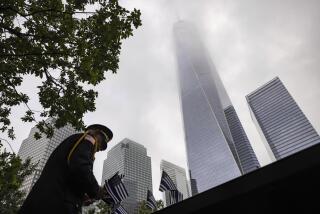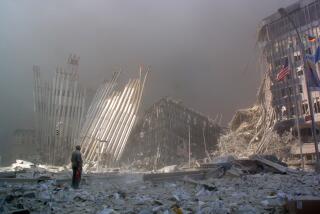Critic’s Notebook: 9/11-related TV programs to watch
- Share via
The 10th anniversary of the attack on the World Trade Center and the Pentagon arrives a week from Sunday — I don’t think I need to tell you the date — and as might be expected, television is all over it. Our decimal culture encourages comment, celebration or reflection whenever 10 years go by, but there is something about this anniversary that makes it practically inescapable. It is especially inescapable, one might say, now that the death of Osama bin Laden and the upcoming dedication of a memorial that transforms the footprint of the missing Twin Towers into inverted fountains have brought the narrative that began Sept. 11, 2001, to something like a close — though there are volumes left to be written.
It’s been suggested that this year’s glut of 9/11 specials (thickened with repeats from earlier years and anniversaries) risks trivializing a time of unspeakable tragedy, of exploiting the moment as much as honoring it (a fine line the media walk most days). Of course, the trivialization of 9/11 can be said to have begun on the very morning of Sept. 11, as reality was quickly framed with special graphics and music and the conjectural chatter of time-filling talking heads; television brings everything down to its level. Yet to the extent that the nation and the world became one, for those few days, it was through the window of a TV screen.
And on its 10th anniversary, it is once again a story that any network whose business is even partially news or history cannot afford to ignore — there will be special editions of most major network news and morning shows, at least three of which are partially titled “America Remembers.” But for all the many programs offered, it is only a glut if you set out to watch them all, which no reasonable person would; you can watch airliners fly into buildings only so many times before you are only punishing yourself or the pictures lose their meaning. We will choose from this oversized menu just as many items as we think we need, or can stand.
It’s true that in looking for a fresh angle, some networks may have stretched the often overlapping material thin. There is no arguing, theoretically, with NBC’s “Children of 9/11” (premieres Monday) or CNN’s “Beyond Bravery: The Women of 9/11” (Thursday). or even OWN’s “Twins of the Twin Towers” (acquired from BBC Wales), about twins who lost their counterparts in the Twin Towers (Sept. 11). In spite of its disaster-movie re-creations, TLC’s “9/11: Heroes of the 88th Floor” (Sunday) does tell an impressive story of almost matter-of-fact personal sacrifice. Fox News’ “Freedom Rising” with Shepard Smith (Sept. 11) finds that network’s most reasonable man reporting on the rebirth of the World Trade Center and the 9/11 memorial and museum. “Nova: Engineering Ground Zero” (Wednesday, KOCE) covers much the same ground, with more science and better photography.
But further from ground zero, we find a Showtime documentary on Paul McCartney preparing for the benefit Concert for New York (“The Love We Make,” Sept.10); Biography’s paranormal “Beyond: Messages of 9/11” (Sept. 10); Animal Planet’s “Saved” (Wednesday), about pets helping affected families cope; “When Pop Culture Saved America: A 9/11 Story” (Biography, Monday, about singers doing similar service; and “The Suze Orman Show: Money Lessons of 9/11 (CNBC, Sept. 10).
On the other hand, the sense of occasion that 10 elapsed years creates has brought some big fish to the pool. Former President George W. Bush sits for National Geographic Channel’s “George W. Bush: The 9/11 interview.” (Already premiered, it will be re-shown Saturday, Sunday and Sept. 11, as will “Giuliani’s 9/11,” the network’s interview with the then-mayor of New York City.) Top-level decision-makers, including then-Vice President Dick Cheney, Secretary of Defense Donald Rumsfeld, Rudy Giuliani and heads of emergency services and the Federal Aviation Administration, and a host of firsthand witnesses to their work appear in the Smithsonian Channel’s “9/11: Day That Changed the World” (Monday), which feels more than usually fresh and revealing, given how often, and for how many years, the ground has been covered.
Though the tone of these programs is largely elegiac or inspirational, a few detail the work that remains to be done — or undone. PBS’ “Frontline: Top Secret America” (KOCE, Tuesday), about the unchecked growth in clandestine operations in the wake of 9/11. CNN’s “Dr. Sanjay Gupta Reports: Terror in the Dust,” Wednesday and Sept. 10) on the health of the much-afflicted, often-neglected first responders.
If I were going to recommend only one of these programs, of the more than several I’ve seen — and it may not be a bad idea to watch only one — it is History Channel’s “9/11: The Days After” (Friday). A sequel to the 2008 “102 Minutes That Changed America” (which will be rebroadcast on Biography, A&E, History and Lifetime on Sept. 11), it begins in the immediate aftermath of the collapse of the Twin Towers. Assembled mostly from home video and B-roll news footage, it proceeds without narration or talking heads. What would usually be considered mistakes — false starts, wild shots, random chatter — are left in for immediacy. It is a construction, unavoidably, but one that does not tell you what to think or how to feel — there is a quiet score, which helps knit the pieces without unduly coloring it — and puts you, as much as possible, into the place and time. As such it is hard to watch, and impossible to turn off.
More to Read
The biggest entertainment stories
Get our big stories about Hollywood, film, television, music, arts, culture and more right in your inbox as soon as they publish.
You may occasionally receive promotional content from the Los Angeles Times.











